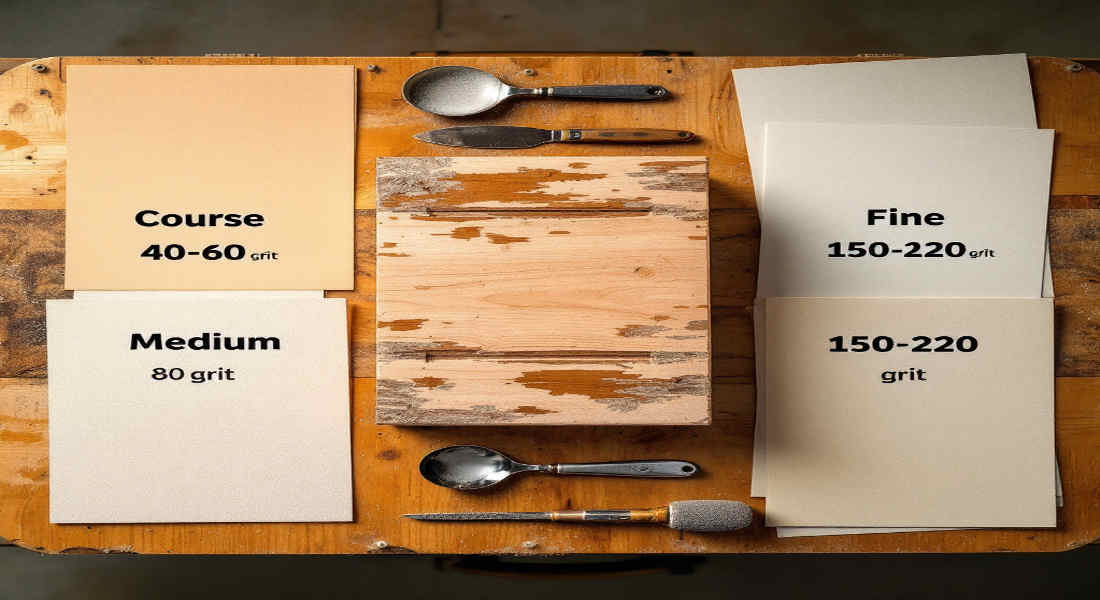Furniture restoration is an art that combines patience, skill, and the right tools. One of the most essential tools in this process is Sandpaper. Whether you’re stripping old paint, varnishing, or preparing wood for refinishing, Sandpaper plays a crucial role. However, choosing the right grit sandpaper can be challenging, especially for beginners. If you’re wondering what grit sandpaper for stripping home furniture is best, this guide has all the answers.
Understanding Sandpaper Grits: What They Mean and Why They Matter
Sandpaper grit is a term that refers to the coarseness or fineness of the abrasive particles on the Sandpaper. These particles are responsible for smoothing or stripping surfaces. The grit number on the Sandpaper tells you the size of the particles: the lower the number, the coarser the Sandpaper, and the higher the number, the finer it is.
How Sandpaper Grit Works
- Coarse grits (40-60 grit): These are aggressive and great for removing thick layers of paint, varnish, or other finishes.
- Medium grits (80-120 grit): These are versatile and used to remove residue left by coarse grits or smooth rough surfaces.
- Fine grits (180-220 grit and above): These are designed for smoothing wood and preparing the surface for finishing.
Why Sandpaper Grit Matters
Using the wrong grit can lead to problems:
- Too coarse: It may damage the wood, leaving deep scratches.
- Too fine: It can clog quickly and make stripping paint or varnish inefficient. Understanding the grit scale ensures you choose the right Sandpaper for each stage of furniture restoration.
What Grit Sandpaper for Stripping Home Furniture?
When stripping furniture, the grit you use depends on the type of finish you’re removing and the condition of the wood. Let’s break it down step by step.
You may also read (does my house need to be tidy for valuation).
Best Grit Range for Stripping Furniture
- Coarse Grits (40-60):
- Ideal for heavy-duty stripping tasks.
- Removes thick layers of paint or varnish efficiently.
- Use with caution to avoid gouging the wood.
- Medium Grits (80-120):
- Perfect for tackling leftover residue after coarse sanding.
- Smooth rough spots and start to prepare the surface for refinishing.
- Fine Grits (180-220):
- Used for the final preparation of the wood surface.
- Ensures a smooth finish, ready for staining or painting.
Why Start Coarse and Transition to Fine
Starting with a coarse grit quickly removes most of the old finish. Transitioning to finer grits smooths out the scratches left by coarser Sandpaper, leaving the wood ready for a new coat of paint or stain. Skipping these steps can result in uneven surfaces or poor adhesion to the new finish.
The 5 Best Grit Sandpapers for Stripping Home Furniture
Now that you understand the basics let’s discuss the 5 best grit sandpapers for your furniture stripping projects. Each option serves a specific purpose, ensuring an effective and professional finish.
40-Grit Sandpaper
- Best For: Removing thick layers of paint, varnish, or heavy finishes.
- Features: Extremely coarse and abrasive.
- Pros:
- Quickly removes stubborn finishes.
- Works well on tough, uneven surfaces.
- Cons:
- It can leave deep scratches if used too aggressively.
- Recommended Types: Aluminum oxide sandpaper for durability.
60-Grit Sandpaper
- Best For: Heavy stripping with slightly more control than 40-grit.
- Features: Coarse but less aggressive than 40-grit.
- Pros:
- Effective for stripping paint or varnish without as much risk of gouging.
- Balances speed and precision.
- Cons:
- Still too rough to finish work.
- Recommended Brands: 3M Aluminum Oxide Sandpaper.
You may also read (home to get hot at night).
80-Grit Sandpaper
- Best For: Starting the smoothing process after stripping.
- Features: Medium-coarse grit for versatile use.
- Pros:
- Removes leftover residue from coarse sanding.
- Prepares the surface for finer grits.
- Cons:
- It may still leave visible scratches.
- Recommended Uses: Great for sanding down uneven surfaces.
120-Grit Sandpaper
- Best For: Smoothing the surface after initial stripping.
- Features: Medium grit for detailed work.
- Pros:
- Prepares the wood for refinishing.
- Balances removal and smoothing.
- Cons:
- It is not suitable for removing thick finishes.
- Recommended Brands: Garnet sandpaper for smooth results.
220-Grit Sandpaper
- Best For: Final sanding before applying paint or stain.
- Features: Fine grit for a polished finish.
- Pros:
- Creates a smooth, professional surface.
- Ideal for finishing touches.
- Cons:
- Ineffective at removing heavy finishes.
- Recommended Uses: Use after all other sanding steps.
Grit Best Use Pros Cons
40 Heavy stripping Fast and effective Can leave deep scratches
60 Heavy stripping with precision Balanced removal and control Still abrasive
80 Residue removal Versatile and efficient May leave minor scratches
120 Smoothing before finishing Prepares wood for refinishing Not for thick paint removal
220 Final sanding Creates a professional finish that is Ineffective for initial stripping
How to Use Sandpaper Effectively When Stripping Furniture
Even with the right grit, proper sanding technique is key to achieving the best results. Follow these steps for effective furniture stripping:
Step-by-Step Sanding Guide
- Start with the Coarsest Grit Needed:
- Begin with 40- or 60-grit sandpaper to remove heavy finishes.
- Sand With the Grain:
- Always sand in the direction of the wood grain to avoid scratches.
- Transition to Finer Grits:
- Move to 80 and then 120 grit to smooth the surface.
- Clean Between Stages:
- Wipe off dust between each sanding stage for a cleaner finish.
- Finish with Fine Grit:
- Use 220-grit for the final touch before applying paint or stain.
Tips and Safety Measures
- Safety First: Wear a dust mask and goggles, and ensure proper ventilation.
- Avoid Over-Sanding: Be cautious not to sand away too much wood.
- Hand Sanding vs. Power Sanding:
- Hand sanding offers precision, while power sanders save time on large surfaces.
Additional Tips for Choosing and Maintaining Sandpaper
Sandpaper comes in different materials, and each has unique benefits:
- Aluminum Oxide: Durable and versatile for wood and metal.
- Garnet: Best for smooth finishes on wood.
- Silicon Carbide: Great for wet sanding and fine polishing.
How to Maintain Sandpaper
- Replace Sandpaper when it becomes clogged or ineffective.
- Store sandpaper in a dry, flat place to prevent curling or damage.
Budget Considerations
High-quality Sandpaper may cost more upfront but lasts longer and delivers better results. For DIY enthusiasts, investing in trusted brands is worth it.
You may also read (how shine home).

